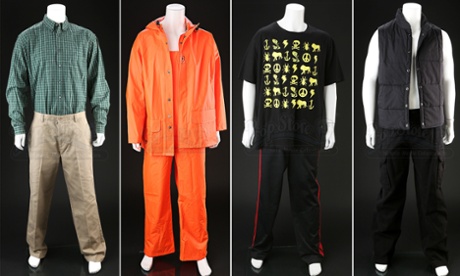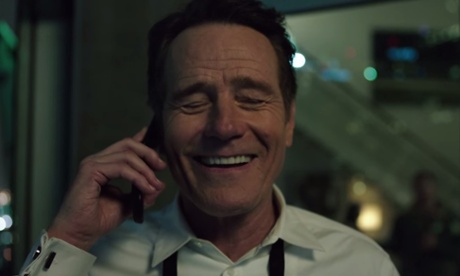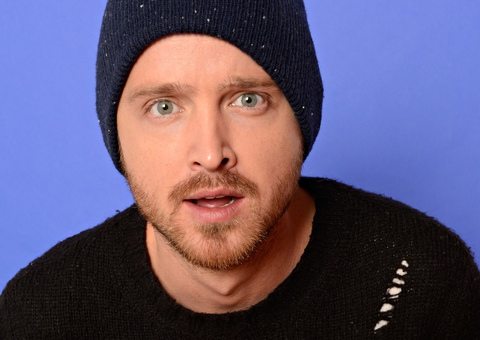"Wait, Jesse! Jesse, just listen to me. Jesse!"
It's a bleak winter's day in Albuquerque. The Sandia mountains that loom over the city are fringed with snow. A biting wind howls along empty streets. There is an eerie feeling, as if the city is in hibernation. The only people in sight belong to a crowd in Civic Plaza. They're filming a scene for the final series of Breaking Bad, and at the heart of the group stands Bryan Cranston in character as the show's antihero, Walter White. His head is shaved, he has a tightly cropped goatee beard, and all his clothes are black. With his mobile phone pressed to his ear, he has a fixed, glowering look on his face.
That look will be familiar to fans of the programme that has followed in the footsteps of The Sopranos and The Wire by creating a television drama that, in its complexity and ambition, stands toe-to-toe with any comparable big-screen offering. White is a middle-aged chemistry teacher who, upon receiving a diagnosis of terminal lung cancer, decides to start making and selling crystal meth.
From that unlikely career move stem consequences that ripple outwards until the mild-mannered teacher is nothing but a ghost, replaced by a ruthless criminal who prefers (indeed insists) on being known by the nom de guerre Heisenberg. It's Heisenberg who is etched on Cranston's features right now.
Later that day, in a thankfully warmer room overlooking the plaza, Cranston gives his take on the character that, in his words, changed his career "tremendously, completely". He has discussed Walter White and his motivations any number of times but there is little sign of his having got bored of the topic yet. Indeed, as the conversation goes on, perhaps helped by the fact that he's still in his black get-up, a thin plaster running across his cheek, I get the distinct impression I'm talking not to Cranston but to White, or rather Heisenberg himself.
"This type of character has never been depicted before," he enthuses. "Nowhere in the history of television – think about this – have we seen a character go through this metamorphosis. When we look at our favourite television shows, they've all stayed the same; stasis is part of television lore. What drew people to television, was: 'Every week I'm going to see the same guy and I'm grateful for that.'
"But with Breaking Bad we were looking to do something that would upset people. Week after week they're watching, going, 'Ooh, what's he doing now?' and 'I used to like him, now I hate him – he was a good guy, now he's a bad guy and I'm confused and, grrrr, I'm pacing and …'"
He pauses, letting the heat out of his voice: "The passion and the vitriol that this show creates, it's unprecedented."
Part of the alchemy of Breaking Bad lies in the way Walter's transition from hero to (nigh-on) villain is executed. A suspension of disbelief is rarely required, so consistently applied are the rules of cause and effect. Professional pride and technical skill leads Walter to craft the finest meth in the southwestern states of America, but that attracts the attention of genuinely criminal individuals. Walter in turn is forced to defend himself, but the only effective options are those that make him increasingly indistinguishable from those he is confronting.
"The thing that feels the most telling, really, is the very first decision when Walter chose to become someone he's not," says Cranston. "The first time he decided, 'I'm going to cook crystal meth and make money.' That's not him. He's not in his element.
"For a smart man, it was a stupid, very shortsighted decision. He soon realises he doesn't have the skills for it, but by now it's rolling, and it's rolling away from him. It's like an avalanche: he's constantly just ahead and he's got to keep moving. So when it comes to later in the seasons and he calls for the execution and murder of nine people in jail it actually makes sense to him."
So, yeah, it's fair to say that Walter does change a bit over time. The jail massacre is one of Season Five's major scenes, alongside a breathtaking railway robbery (performed on a speeding train) and a crucial discovery made on the toilet. It's this bathroom revelation that sets up the final eight episodes (Season Six or 5B depending on your preference), which – in a rare moment of synchronisation for a programme that has largely been ignored by UK broadcasters – are to air over here just 24 hours after US transmission, on Netflix.
"It's a very odd business when you have to talk to your director about how to take a shit," notes Dean Norris, who plays Walter's nemesis and brother-in-law Hank Schrader. "I think what Breaking Bad does first of all is put comedy and drama together. Then it does the small, intimate scenes brilliantly. But we also have these operatic scenes that no other show, including The Wire, really does. We don't limit ourselves to naturalism and realism; sometimes we're surreal."
Hank is a blowhard man's man but also a DEA agent, whose path is inextricably, unavoidably drawn towards that of the mysterious Heisenberg. He's had his fair share of operatic moments: from encountering an informant whose severed head had been placed on top of a tortoise, to combatting twin Mexican assassins in a Shoe Dept car park. Now, after his toilet revelation – he finds a book that contains an inscription linking Walter to Heisenberg – there is a showdown coming and not many are anticipating it will end in a hug.
That it is going to end, however, is guaranteed. Creator Vince Gilligan has built towards an ending from day one, even if its precise form has not always been clear ("I can't even remember what my original ending was," he admitted recently). Breaking Bad will not be cancelled mid-run or allowed to run on until its vital juices have been fully drained. Neither will it end with a black screen. That, however, almost heaps more pressure on these final eight episodes.
Over the two days that we are allowed on to the set of the show, everyone is looking for clues. We hear snatches of dialogue and wonder what it means (Walter and Jesse nearly killed each other the last time they saw each other, so why are they speaking again?). We get a tour of the massive sound stage on which interior scenes are filmed and speculate as to why a photograph of Season Five newcomer Todd is placed so prominently on a wall; why Walter's car – the Pontiac Aztek that he sold on in Season Five – is sitting in the car park with its front panels smashed in; why a capsule of ricin (manufactured by Walter in Season Four and surely Breaking Bad's equivalent of Chekhov's loaded gun) is sitting in a props trolley on the side of Civic Plaza.
In that sense, at least, everyone is in the same boat. "I don't know the ending, I haven't asked," says Cranston. "Truthfully, I want this series to end exactly as Vince Gilligan wants it to end. I have no designs. I only read the scripts one week ahead of time. I'm along for the ride as well as the audience."
Whatever the outcome, Breaking Bad has left its mark. This is because, however unlikely the scenario, we can all relate to the show's core issues. What lengths would we go to to protect our families? For what price would we compromise our morals? What does it mean to be alive?
"In my initial research for a role, I always try to find the emotional core of a character," says Cranston. "For Hal in Malcolm In The Middle it was fear. He was afraid of everything and there's a lot of comedy to be mined from fear. With Walt, I had a difficult time. I was trying to get in there and I was getting frustrated.
"Then I realised: 'Oh, I know what it is.' In the beginning, his emotional core was so introverted from looking at apathetic students and his own missed opportunities that he imploded. He loved his family but for the most part it was just about getting by. Then this thing happened, this diagnosis, and a volcano erupted. Now his emotions spewed, they shot out: fear, anxiety, worry, power, thirst, hunger, lust, avarice, hubris … He's feeling everything and he's alive. He hasn't been alive for most of his adult life but now he is, it's just for two years but he's fucking alive. He's ready to go and, in some ways, I don't know if he would trade it."
Soon, we'll find out just how expensive that trade might be.
Breaking Bad will be available to Netflix members in the UK and Ireland starting on 12 Aug, with new episodes available every Monday











